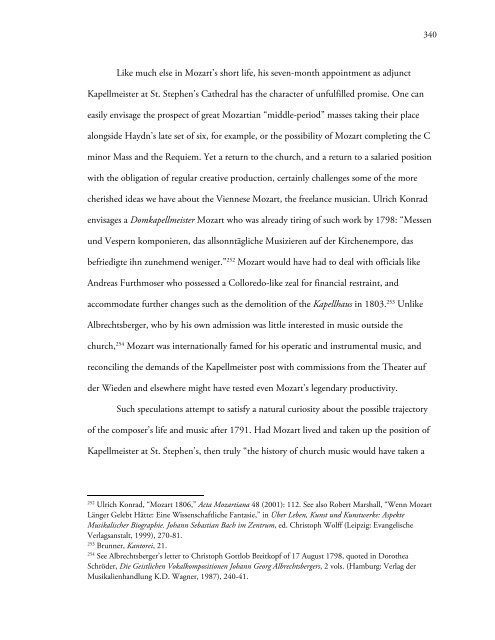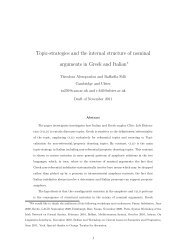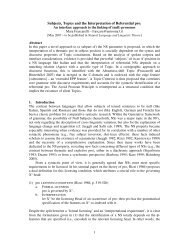- Page 1 and 2:
MOZART AND THE PRACTICE OF SACRED M
- Page 3 and 4:
Prof. Christoph Wolff, advisor Davi
- Page 5 and 6:
In Omnibus Glorificetur Deus M pia
- Page 7 and 8:
Acknowledgements A study of this ki
- Page 9 and 10:
Neal Zaslaw. Dexter Edge was an ess
- Page 11 and 12:
KBZ Tschink, Kajetan, ed. Kritische
- Page 13 and 14:
surprising that the ceremony was an
- Page 15 and 16:
on Jews. Church music was, so far,
- Page 17 and 18:
fidelium animi ad spiritualium reru
- Page 19 and 20:
liturgical calendar enjoyed the sup
- Page 21 and 22:
Figure 1.1. The Consistorium’s pr
- Page 23 and 24:
appeared somewhat disingenuous, for
- Page 25 and 26:
“military music” were heard in
- Page 27 and 28:
Figure 1.2. First page of signature
- Page 29 and 30:
Vorfallenheiten und Feierlichkeiten
- Page 31 and 32:
mentioned by Leopold Mozart. 43 Bot
- Page 33 and 34:
could cite not only Muratori for ph
- Page 35 and 36:
medical care, the housing of orphan
- Page 37 and 38:
esponsible priests. 60 Joseph himse
- Page 39 and 40:
Lent, the number of parishes in Vie
- Page 41 and 42:
Figure 1.4. Migazzi’s petition to
- Page 43 and 44:
outset; see Figure 1.5. One excepti
- Page 45 and 46:
the restrictions was the natural ou
- Page 47 and 48:
Cistercian, Dominican and other con
- Page 49 and 50:
music in some form, and experienced
- Page 51 and 52:
een written by Wolfgang to his fath
- Page 53 and 54:
Zeit lediger allzeit mitsammen so w
- Page 55 and 56:
Mozart was concerned with reassurin
- Page 57 and 58:
Seyn Sie nicht gar zu andächtig, g
- Page 59 and 60:
Daß die ohnöthigen bildereyen in
- Page 61 and 62:
Unterdessen will ich ihnen benachri
- Page 63 and 64:
instrumentally accompanied music fr
- Page 65 and 66:
dolorosa von Haydn - aber hatte mir
- Page 67 and 68:
performance of the mass ordinary an
- Page 69 and 70:
Figure 2.1. Opening of Frieberth’
- Page 71 and 72:
provided obsequies for Mozart and a
- Page 73 and 74:
More celebrated than Richter’s te
- Page 75 and 76:
conditions of employment differed s
- Page 77 and 78:
Work Catalogue Principal Source(s);
- Page 79 and 80:
Work Catalogue Principal Source(s);
- Page 81 and 82:
Work Catalogue Principal Source(s);
- Page 83 and 84:
Work Catalogue Principal Source(s);
- Page 85 and 86:
composer’s maturity. The C minor
- Page 87 and 88:
The recovery of several autographs
- Page 89 and 90:
status of the church. Albrechtsberg
- Page 91 and 92:
autograph but appears consistent wi
- Page 93 and 94:
“Mottett” in 1789. 53 The autog
- Page 95 and 96:
performance has been exaggerated. I
- Page 97 and 98:
Determining the identity of the wor
- Page 99 and 100:
There is no sure way of identifying
- Page 101 and 102:
erhielt ich in Partitur-Abschrift;
- Page 103 and 104:
Mozart’s “lieblingsfach,” the
- Page 105 and 106:
Figure 2.6. Score of Davide, signed
- Page 107 and 108:
often accompanied her (Madame Mozar
- Page 109 and 110:
A number of commentators have specu
- Page 111 and 112:
Example 2.1. Jesu Rex patriarcharum
- Page 113 and 114:
Example 2.2. Opening of the final f
- Page 115 and 116:
Figure 2.7. Title page of the Vienn
- Page 117 and 118:
that city. This would seem to imply
- Page 119 and 120:
combining: on 31 August 1782, the d
- Page 121 and 122:
One of the chief documents supporti
- Page 123 and 124:
Fischer’s copy of K. 321. 142 As
- Page 125 and 126:
was not the usual disposition, eith
- Page 127 and 128:
including the organ and woodwind, c
- Page 129 and 130:
not square. 166 Both the organ part
- Page 131 and 132:
form, but K. 427 itself seems to ha
- Page 133 and 134:
Figure 2.10. Violino 2 do from an u
- Page 135 and 136:
The three sketchleaves mentioned ab
- Page 137 and 138:
educed to a one-to-one corresponden
- Page 139 and 140:
might receive a pension from the To
- Page 141 and 142:
services involving the court are do
- Page 143 and 144:
withholding on the curious grounds
- Page 145 and 146:
Signature Work Date(s) Comments 54
- Page 147 and 148:
Signature Work Date(s) Comments 28
- Page 149 and 150:
Figure 3.1. Title of the Hofkapelle
- Page 151 and 152:
Ecce quomodo moritur justus by Jako
- Page 153 and 154:
it seems that Wenzel Sukowaty, the
- Page 155 and 156:
Figure 3.3. Violino Primo part in a
- Page 157 and 158:
Two works by Salieri himself, a Mas
- Page 159 and 160:
Salieri...geflochten hatte, öffnet
- Page 161 and 162:
Figure 3.5. Autograph opening of Pa
- Page 163 and 164:
parts taken by Catarina Cavalieri,
- Page 165 and 166:
Cathedral preserves two sets of par
- Page 167 and 168:
the 1780s do however set texts of a
- Page 169 and 170:
The two “sacred songs” O Gottes
- Page 171 and 172:
paper is ruled with 14 staves, a ch
- Page 173 and 174:
A letter from Norbert Lehmann to Ni
- Page 175 and 176:
Example 3.1. Jacquin: Wir werfen un
- Page 177 and 178:
Example 3.1, continued. 166
- Page 179 and 180:
of a sacred piece sitting on Mozart
- Page 181 and 182:
Figure 3.9. Opening of Mozart’s c
- Page 183 and 184:
handwriting in the two psalm settin
- Page 185 and 186:
Nativity of the Virgin and St. Leop
- Page 187 and 188:
Figure 3.12. Opening of the second
- Page 189 and 190:
Mozart’s selection of two homopho
- Page 191 and 192:
eference to the Thomaskantor in Moz
- Page 193 and 194:
church sonatas of Fux and Caldara.
- Page 195 and 196:
Figure 3.13. Title page to a set of
- Page 197 and 198:
central and northern Germany, altho
- Page 199 and 200:
violas and woodwind. The most disti
- Page 201 and 202:
If Plath’s dating of Fr 1790a to
- Page 203 and 204:
orchestrates the first few bars, th
- Page 205 and 206:
Figure 3.15. Entries for the Kyrie
- Page 207 and 208:
suggestion in the literature: a Vie
- Page 209 and 210:
players at great expense, but it is
- Page 211 and 212:
Figure 3.16. The musicians of the H
- Page 213 and 214:
speaking, this is an attractive the
- Page 215 and 216:
Figure 3.17. Last page of concertma
- Page 217 and 218:
separated was high. 218 A further c
- Page 219 and 220:
Figure 3.18. The hand of Joseph Hof
- Page 221 and 222:
Joseph Hoffmann was at the centre o
- Page 223 and 224:
Nurscher died of “Brustwassersuch
- Page 225 and 226:
the composer. 238 In contrast, the
- Page 227 and 228:
Figure 3.23a. First page of Salieri
- Page 229 and 230:
now lost, so we will never know if
- Page 231 and 232:
e Alma Dei creatoris MH 221, a copy
- Page 233 and 234:
the “etwas kleinere” mass offer
- Page 235 and 236:
Figure 3.25a. Works by Mozart in Sa
- Page 237 and 238:
Mosel’s statement is only partial
- Page 239 and 240:
a mass by Kozeluch himself has an a
- Page 241 and 242:
Table 3.4. Performance calendar for
- Page 243 and 244:
der Musikfreunde in Vienna; see Fig
- Page 245 and 246:
Figure 3.28. Violino Primo in a set
- Page 247 and 248:
e pursued in detail here, and the e
- Page 249 and 250:
Table 3.5. Some early copies of K.
- Page 251 and 252:
Krönungsfeyer S r . M. / Franz. I
- Page 253 and 254:
Figure 3.31. Title page of a set of
- Page 255 and 256:
FOUR A Kapellmeister at St. Stephen
- Page 257 and 258:
dell’organo.” 5 If carried out,
- Page 259 and 260:
It is difficult to say whether the
- Page 261 and 262:
through local congregations and not
- Page 263 and 264:
independence from the ecclesiastica
- Page 265 and 266:
Cathedral to cave in, destroying mu
- Page 267 and 268:
Figure 4.3. Choirloft and organ at
- Page 269 and 270:
copied before Reutter became Kapell
- Page 271 and 272:
Maestro di Capella part for the off
- Page 273 and 274:
Figure 4.6. Harmonisation of chant
- Page 275 and 276:
Figure 4.7. Pope Pius VI celebrates
- Page 277 and 278:
to equate these necessarily with th
- Page 279 and 280:
Whether Burney communicated any of
- Page 281 and 282:
Gottesdienstordnung, the town counc
- Page 283 and 284:
Figure 4.9. Inventory of the St. St
- Page 285 and 286:
Name Position Table 4.1. Musicians
- Page 287 and 288:
Name Position Table 4.2. Music pers
- Page 289 and 290:
Name Position Payment (fl.xr) Comme
- Page 291 and 292:
Year Essential Gnadenbild (fl.xr) C
- Page 293 and 294:
comparatively small remaining amoun
- Page 295 and 296:
intention of departing Vienna in th
- Page 297 and 298:
were present at St. Stephen’s on
- Page 299 and 300: Whatever the background, Mozart eve
- Page 301 and 302: Als Hr: kapellmeister Hofmann krank
- Page 303 and 304: 292 Figure 4.12. Deleted rejection
- Page 305 and 306: information, for the mention of the
- Page 307 and 308: and the newly-written Ave, verum co
- Page 309 and 310: Figure 4.14. Autograph petition by
- Page 311 and 312: Question. Whether he occasionally a
- Page 313 and 314: IV. MUSIC AT THE BADEN PFARRKIRCHE
- Page 315 and 316: most renowned of the composer’s s
- Page 317 and 318: elations with Stoll after the death
- Page 319 and 320: following letter to Constanze, Moza
- Page 321 and 322: months. 170 For our purposes, the p
- Page 323 and 324: Figure 4.15. Opening of Mozart’s
- Page 325 and 326: Figure 4.17. Verso of Mozart’s (
- Page 327 and 328: Perhaps the shared key of the mass
- Page 329 and 330: Es dürfte wahrscheinlich nur wenig
- Page 331 and 332: then Hofbibliothek in Vienna, where
- Page 333 and 334: example, sets of parts used in Bade
- Page 335 and 336: Figure 4.18. Title wrapper of a set
- Page 337 and 338: evival of Die Entführung aus dem S
- Page 339 and 340: paper dimensions, watermarks, the s
- Page 341 and 342: Figure 4.19. Canto part for Ave, ve
- Page 343 and 344: and other material. 222 Among the n
- Page 345 and 346: suggests that Mozart took part in t
- Page 347 and 348: eceived a letter from her, “welch
- Page 349: welche Wonne!” in Die Zauberflöt
- Page 353 and 354: FIVE Mozart’s Obsequies 342 Die M
- Page 355 and 356: leading up to the Exequien for Moza
- Page 357 and 358: Leuthe, Lichtern, Kirchen apparaten
- Page 359 and 360: The score of Gluck’s De Profundis
- Page 361 and 362: the material derives from the Hofka
- Page 363 and 364: Figure 5.3. Wrapper of parts for Ga
- Page 365 and 366: part is marked “Trani” in the I
- Page 367 and 368: II. THE COMMISSIONING OF THE REQUIE
- Page 369 and 370: eplacement for the usual clarinet p
- Page 371 and 372: Bauman, it is “unworthy of Mozart
- Page 373 and 374: Whatever attitudes Mozart may have
- Page 375 and 376: several works for the German liturg
- Page 377 and 378: service in the orchestra, and it ma
- Page 379 and 380: Figure 5.7. Autograph opening of S
- Page 381 and 382: Figure 5.8. Autograph title page of
- Page 383 and 384: comparisons between Mozart and Süs
- Page 385 and 386: Süssmayr’s relations with Salier
- Page 387 and 388: Musikfreunde, was witnessed by Sali
- Page 389 and 390: The earliest report, completed in P
- Page 391 and 392: Taken as a group, the four reports
- Page 393 and 394: otherhood, the St. Cecilia Brudersc
- Page 395 and 396: Fortunately, a number of Johann Geo
- Page 397 and 398: Figure 5.11. “Singers’ graffiti
- Page 399 and 400: detailed account of payments and a
- Page 401 and 402:
Majus 1791 [...] 1: 40: p[ro] descr
- Page 403 and 404:
SmWV 226. Both operas are undated,
- Page 405 and 406:
Figure 5.14. Entry in the St. Micha
- Page 407 and 408:
Seelenamt 6.-- Ornat beym Seelenamt
- Page 409 and 410:
Figure 5.15. Receipt by Spangler da
- Page 411 and 412:
the rhythm of the Cum sanctis. 172
- Page 413 and 414:
than 1795, and in a score of Don Gi
- Page 415 and 416:
Figure 5.19. Entry by Freystädtler
- Page 417 and 418:
minor. 186 It may be doubted, howev
- Page 419 and 420:
Discovering the true identity of th
- Page 421 and 422:
organist in Vienna. 200 Benedikt Sc
- Page 423 and 424:
Figure 5.21. Autograph Clarino Imo
- Page 425 and 426:
company entered these parts into Mo
- Page 427 and 428:
Bibliography 850 Jahre St. Stephan:
- Page 429 and 430:
Armstrong, James. “'Litaniae Laur
- Page 431 and 432:
———. “Mozarts Wiener Kirche
- Page 433 and 434:
———. “Mozarts Anstellung am
- Page 435 and 436:
———. “Eine zweite, fast ver
- Page 437 and 438:
———. “The Mozarts' Salzburg
- Page 439 and 440:
Godt, Irving. “Marianna in Italy:
- Page 441 and 442:
Heidrich, Jürgen. Protestantische
- Page 443 and 444:
Howe, Timothy E. “Developing a Hi
- Page 445 and 446:
Klueting, Harm, ed. Der Josephinism
- Page 447 and 448:
———. “Mozart fälschlich zu
- Page 449 and 450:
Manal, Josef. “Die Einführung de
- Page 451 and 452:
Murray, Sterling E. “A Requiem fo
- Page 453 and 454:
———. “Aus Herbecks Leben, W
- Page 455 and 456:
Rice, John A. “Adding Birds to Mo
- Page 457 and 458:
Scheib, Wilfried. “Die Entwicklun
- Page 459 and 460:
Schwerdling, Johann. Practische Anw
- Page 461 and 462:
Strebel, Harald. “Mozart und sein
- Page 463 and 464:
Wallner, Viktor. Wolfgang Amadeus M
- Page 465 and 466:
———. “Mozarts c-Moll-Messe
















